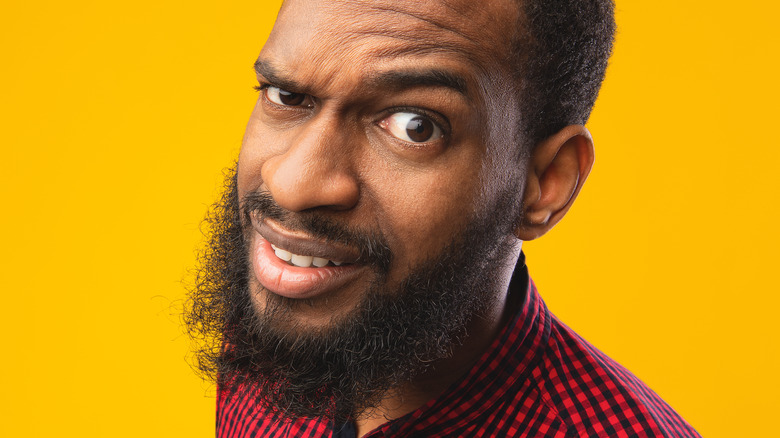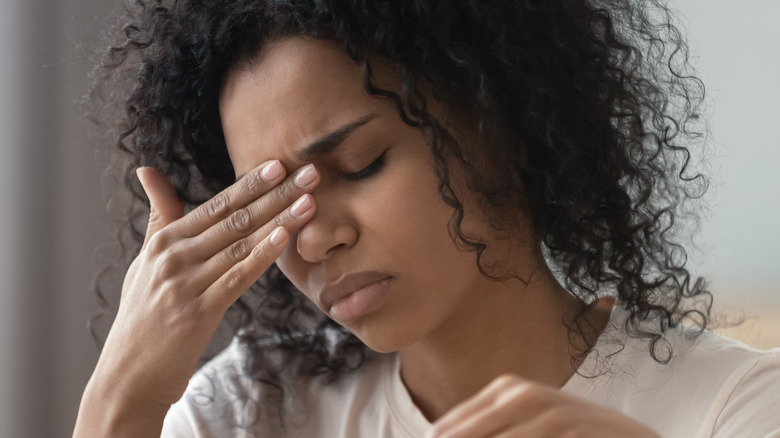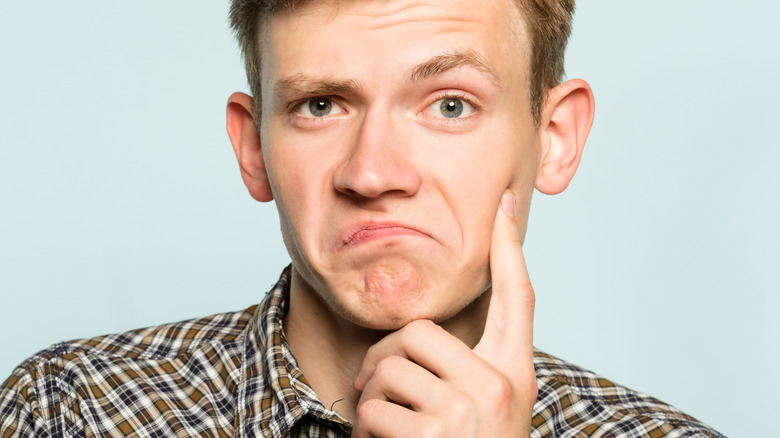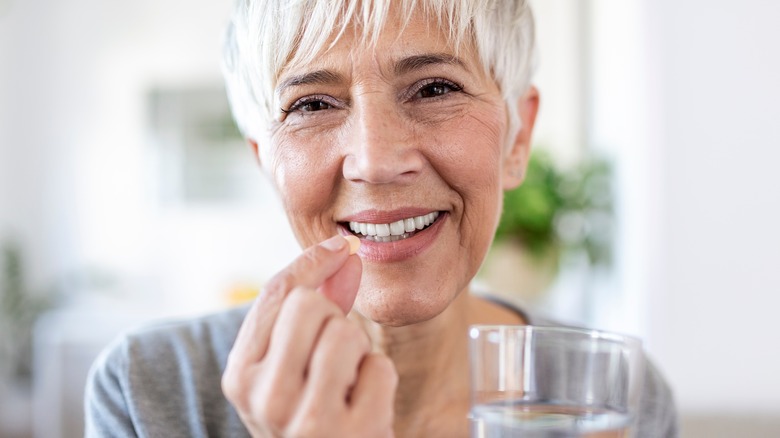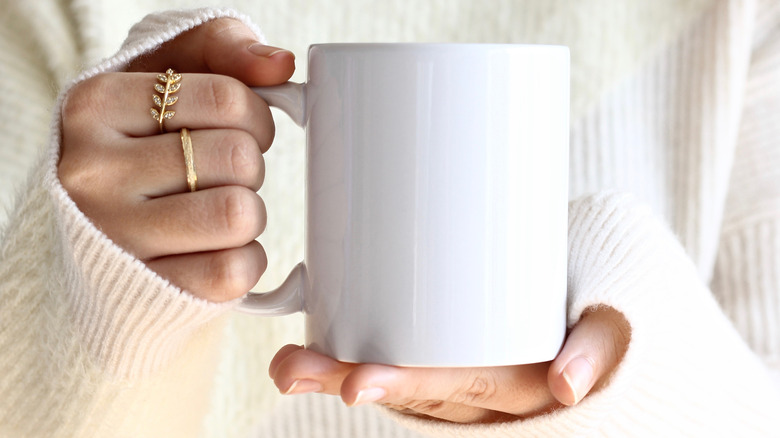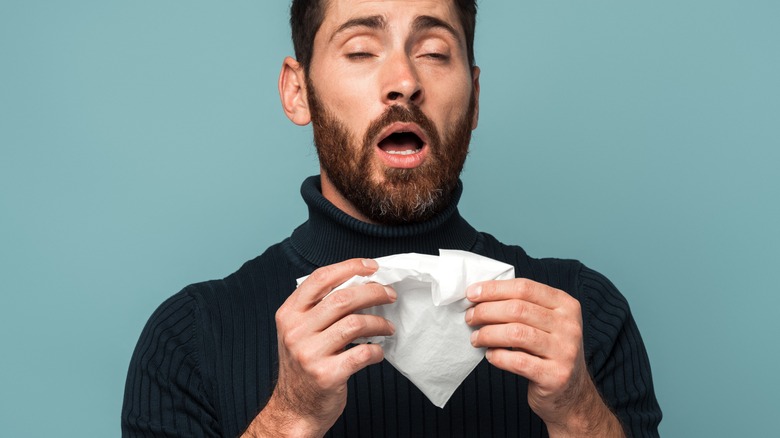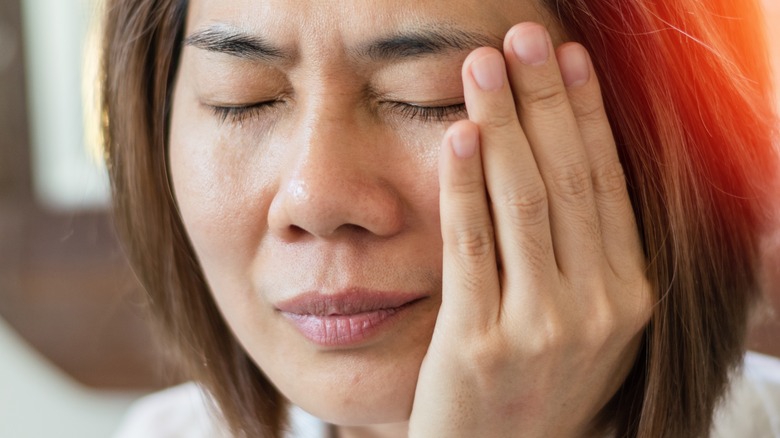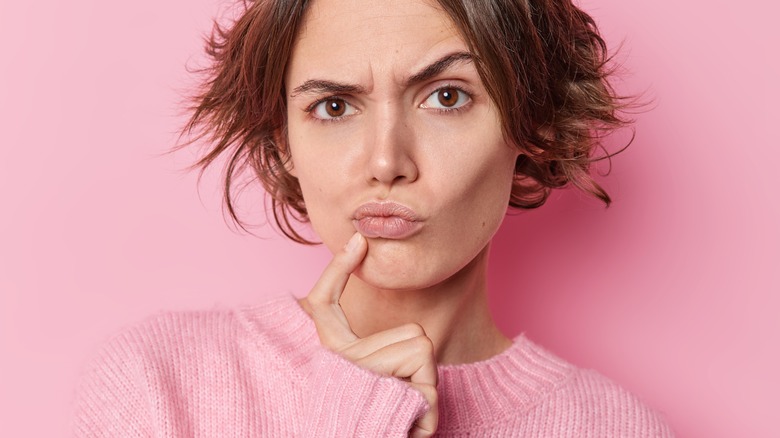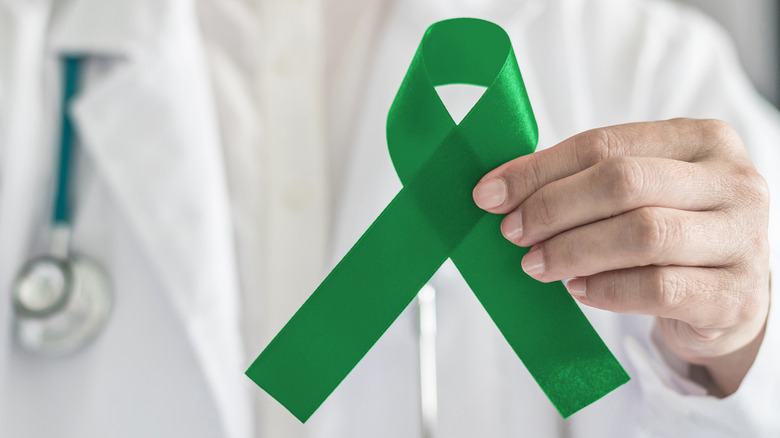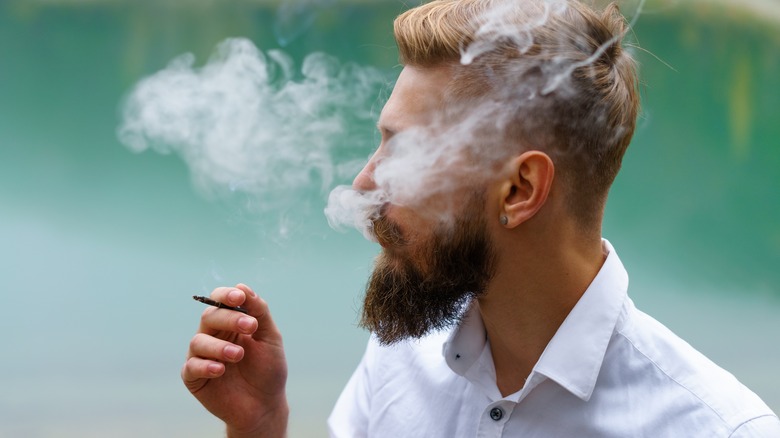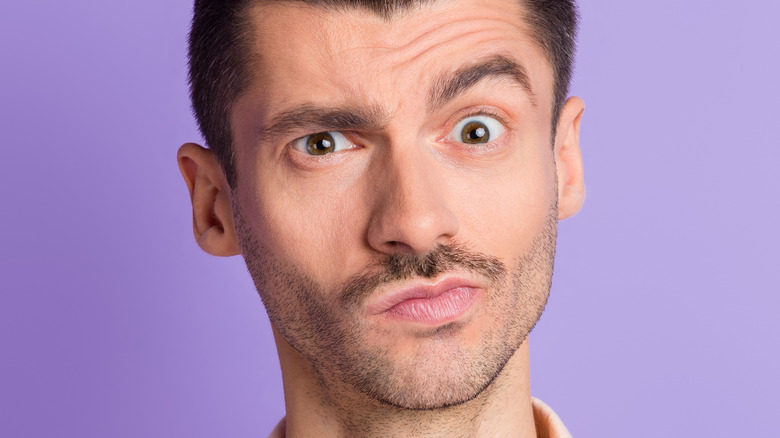Reasons Why Your Eyebrow Won't Stop Twitching
Our eyebrows do way more than we think. It's easy to forget that our eyebrows serve a function beyond just adding definition and visual appeal to our face. These strips of hair play a vital role in keeping our vision unhindered, by catching sweat and moisture and moving it away from our eye area (via Healthline). Our eyebrows also operate as part of our communicatory system, serving to express surprise, anger, concentration, and engagement.
Yet sometimes, it can feel like our eyebrows have a life of their own. And while that's certainly true when you watch a home video and think, "Wow, do my eyebrows really move that much when I talk?!," it's also true when you get a twitch. Our eyebrows are controlled by the frontalis muscle, and are surrounded by several other eye and face muscles (per research published in StatPearls). Twitches that affect these areas can seemingly come out of nowhere and persist for longer than we might like.
But why do eyebrow twitches happen in the first place? And how can we stop them (and avoid the awkward conversations that come with having to explain them away)? We've got all the answers right here.
Your eyebrow twitch could be caused by a magnesium deficiency
Our muscles, like the rest of our bodies, are fed by what we put into them. And failing to get enough of certain nutrients can result in some unexpected consequences. This is the case with the mineral magnesium, and a deficiency of it can lead to muscle twitching, most notably in the eye area and eyebrows (via K Health). Magnesium serves to regulate the impulses in cells, allowing them to communicate with each other efficiently. When our magnesium levels are too low, however, the impulses between cells fire off with slightly less control, and this can manifest in an eyebrow twitch.
While estimates vary, it's been concluded in several studies that up to 20% of people may be deficient in magnesium to some degree, according to research published in the journal Open Heart. Given that the mineral plays a vital role in heart health, brain health, and regulating our blood sugar (per Healthline), we should strive to get enough of it every day. Foods like almonds, peanuts, spinach, black beans, and edamame beans are all rich in magnesium, and can help us get the recommended daily allowance of 400 to 420 milligrams for men and 310 to 320 milligrams for women (via the Cleveland Clinic).
It could be due to eye strain
Have you noticed that your eyebrow twitch came soon after those long drives you took at the weekend? The two could be linked.
Eye strain is a key cause of eyebrow twitching, as well as twitching around the general eye area (via Healthline). Also known as asthenopia, eye strain happens when the eyes are used heavily over extended periods (per Specsavers). The increased activity can affect the muscles around them.
It's worth bearing in mind that eye strain can occur as a result of some pretty innocuous activities, such as reading for too long or simply staring at a computer screen for hours on end. You may also notice that your eyes are feeling sore, burning, or a little more moist than usual, and it can also be accompanied by symptoms beyond your eyes like a sore neck, shoulder discomfort, or a headache. The best way to tackle eye strain is by giving your eyes a well-earned break, especially if it's caused by a computer screen. Make sure that you're frequently taking your eyes away from your screen to look at something in the distance, that your screen brightness isn't too high or too low, and that the general light level in your room isn't overly bright.
Your twitch may be caused by dystonia
Eyebrow twitching can be prompted by a range of things, but some of them may be a little more mysterious than others. One of these could be dystonia, a neurological condition that's characterized by involuntary, repetitive muscle contractions (via NHS Inform).
Dystonia can manifest in one specific place, like your eyebrow, in a form called focal dystonia, where the muscle contraction or twitch is isolated to a single area. Dystonia, however, can also impact larger areas of the body, and some forms of the condition, like generalized dystonia and hemidystonia, may cause twitching or contractions in multiple body parts.
Dystonia is thought to originate from the basal ganglia, the area of the brain that regulates our muscles. While it generally won't interfere with other brain functions, it can be an inconvenient and inhibiting condition to have. As the progression and location of dystonia are different in each patient, it can be hard to determine a set treatment for the condition, for which there's no cure. Some patients, however, may be prescribed muscle relaxant medication or physical therapy, while others may undergo surgery or receive localized injections of botulinum toxin (botox).
Prescription medications can trigger twitches
Medication is useful for the treatment of innumerable things, from chronic medical conditions like epilepsy to simple headaches. But prescription medications can have some curious side effects, and one of them could be a twitching eyebrow, as All About Vision explains.
Even common prescription medications used for the treatment of ADHD may prompt twitching muscles around the eyes. Other types of drugs, such as those used in the treatment of mental conditions like schizophrenia or sedative medications like benzodiazepines, may produce twitching around the eyes and eyelids which appears to reduce once taking them is halted, as research published in Drug, Healthcare and Patient Safety states.
Other everyday medications, like those used for heart conditions, can also prompt those annoying twitches. If you're concerned about whether your medication could be linked to eyebrow twitching, it's worthwhile to discuss it with your doctor. They may be able to alter the dosage, or recommend you switch to a different medication that may not produce the same effects.
It might be your morning coffee
If you're anything like us, your day doesn't properly begin until you take that first sip of coffee. But if you're overdoing it slightly on your caffeine intake, your eyebrows might alert you. Larger amounts of caffeine can result in your eyebrows and other eye muscles starting to twitch, according to Medical News Today.
This is all down to caffeine's relationship with adenosine diphosphate, or ADP (via Ohio State University). ADP works to move energy around our bodies and from cell to cell. Normally, our bodies balance this pretty well, but drinking caffeine can disrupt the relationship between our cells and the amount of energy transfer, speeding things up (per HowStuffWorks). This excess, quickly-moving energy can mean things fire off when they shouldn't — like our muscles, which can start to twitch.
If you think your eyebrow twitching is due to those coffee cups piling up next to your desk, a good way to check is to simply reduce your caffeine intake or cut out coffee altogether. If you notice an improvement, you may have found your trigger.
Allergies can make your eyebrows twitch
Alongside the classic allergy symptoms of a blocked nose and red eyes, there are some symptoms of an allergic response that you might not expect. Eyebrow twitching could be one of them.
Eyebrow and eye twitching occur thanks to the histamine response that produces other, more traditional allergy symptoms, explains Medical News Today. When your eyes start to itch, the natural response is to touch and rub them more, and the increased activity around the area can produce twitching, alongside increased irritation.
If you notice this happening for you, it could be worth taking antihistamines to lessen the allergic response. Antihistamines work to block histamine production, which happens when your body comes into contact with an allergen as a means to protect it from harm (per BUPA). Bear in mind, too, that eyebrow twitches aren't the only unlikely symptom of allergies out there, with allergic rhinitis also prompting things like tooth sensitivity, dark circles under your eyes, and even anxiety, according to One Medical. The body is a perplexing thing, folks!
Bell's palsy may prompt eyebrow and eye twitching
Although some instigators of eyebrow twitching may be mild, others can be more dramatic. Bell's palsy is one such instigator, and can cause twitching in the eyebrow and around the eye (per the Mayo Clinic).
Bell's palsy is a nervous system condition that's diagnosed by a rapid onset of facial paralysis or weakness in the facial muscles, often without warning and getting worse over several days (via Johns Hopkins Medicine). These symptoms usually affect one side of the face, and people who have it exhibit difficulty speaking, smiling, and closing their eyes, and may also drool or produce tears from the affected side.
As such, if you have a twitching eyebrow and it's Bell's palsy, it's perhaps likely that you'll see some other, more noticeable symptoms, too. The good news is that Bell's palsy is usually a temporary condition and the majority of people who have it regain full function in their faces. There are occasions, however, when Bell's palsy doesn't resolve itself. In these situations, further treatment may be needed, with specialist intervention required to bring back facial function (via Johns Hopkins Medicine).
You may just be fatigued
So, you've had a hard week. The boss has been on your case, the kids have been acting up, and you're barely sleeping. And then all of a sudden, you notice that your eyebrow starts twitching. Do you think maybe, just maybe, they're connected? If so, you may be right.
Fatigue and lack of sleep can cause of eyebrow twitching, states K Health. When we get enough rest, our bodies can undergo the processes they need to function correctly, including our neurotransmitters being able to deliver messages between the brain and our nerves that help our muscles work correctly (via Medical News Today). However, when we don't sleep sufficient amounts, our neurotransmitter chemicals don't operate as they should, and we retain too much of them in our brains, instead of them reaching the right place at the right time. This can result in muscle dysfunction and twitching. These twitches can be exacerbated by any stress or anxiety that we experience as a result of sleep loss, which increases tension in our muscles, which can then lead to them twitching.
The solution? Try to get adequate amounts of sleep per night, and reduce sources of stress and tension as much as possible.
Eyebrow twitching can be prompted by multiple sclerosis
Causes of eyebrow twitches are wide-reaching, and sometimes they can be prompted by a condition that affects many other aspects of our body, like multiple sclerosis (MS).
MS affects the central nervous system, with the immune system attacking parts of the body that are crucial to each other and the body's overall well-being (like the brain and spinal cord), according to the National Multiple Sclerosis Society. One of the symptoms of this action can be twitching muscles, including the ones controlling the eyebrows (via Medical News Today).
However, eyebrow twitching isn't the only symptom that people with multiple sclerosis may exhibit. As a condition that impacts the entire system, people who have MS may also experience paralysis, difficulty walking and speaking, and other symptoms like increased levels of tiredness. Multiple sclerosis is a chronic condition, and the severity of symptoms may come and go. Instead of trying to cure the condition, care around MS is focused instead on treating individual symptoms, and therapies that limit its overall impact and progression.
It could be because of alcohol
Although alcohol operates as a muscle relaxant (per Avogel), it can also stimulate the muscles in ways we wouldn't consider. One of these is by causing twitching, particularly in the eyebrows on both sides, explains Diamond Vision.
Alcohol interacts with your system in many ways, but it also interacts significantly with your central nervous system (via Guardian Recovery Network). The substance interferes with the way that your brain communicates with your body and muscles, and the signals that fire between the two can become disrupted, leading to twitching. Alcohol can also deplete your body of minerals called electrolytes, with heavy drinking causing you to lose magnesium content, according to research published in Alcohol and Alcoholism.
This effect can be particularly noticeable after you've drunk alcohol, and once it's fully out of your system. Once your body has rid itself of the substance, your central nervous system ramps back into action, misfiring signals that lead to twitching and spasms. This is particularly prominent when people are chronic drinkers and undergo a detoxing process.
If you or anyone you know needs help with addiction issues, help is available. Visit the Substance Abuse and Mental Health Services Administration website or contact SAMHSA's National Helpline at 1-800-662-HELP (4357).
Your eyebrow twitch may be a hemifacial spasm
While eyebrow twitching can often be caused by an underlying condition, sometimes the twitch is the condition itself.
Hemifacial spasms are one such source of eyebrow twitches, with the condition characterized by uncontrollable muscle twitches occurring on one side of the face (via the Cleveland Clinic). Hemifacial spasms are usually caused by nerves in the face becoming squished. However, they can also happen without a clear reason — a version of the condition known as idiopathic hemifacial spasm. While muscle spasms and twitches commonly start in the eyebrows and around the eye area, they may advance to twitches all over the side of your face.
Unlike some other causes of eyebrow twitching, hemifacial spasms don't have a specific cure in themselves, but there are certain treatments available to reduce their severity. If the hemifacial spasm is prompted by compressed nerves, your doctor may recommend surgery to ease pressure around the area. In other situations, you may be prescribed medication to ease twitching. Botox injections are also a common treatment, with the toxin serving to relax the affected muscles, reducing the amount of twitching you may experience.
It could be because of Tourette's syndrome
Tourette's syndrome is a condition that reveals itself in many ways. The foundation of Tourette's syndrome is the presence of tics, which occur because of the condition's effect on the nervous system, according to the CDC. These tics can take many forms, and vocal tics, which are involuntary sounds or utterances people with Tourette's make, are arguably the most recognizable and frequently represented type. But motor tics are a common symptom of Tourette's, too, and these can appear as repetitive, small movements, like an eyebrow twitch (per the International Parkinson and Movement Disorder Society).
Unlike other eyebrow twitches, which may happen completely unconsciously, people with Tourette's may feel like they have to perform the twitch or movement to relieve a built-up urge. This involuntary movement (and the desire to do it) may persist for a matter of weeks or months. Tourette's syndrome is a lifelong condition, but treatment is rarely required, because the tics don't get in the way of people's everyday lives significantly, and can wax and wane in severity (via the National Institute of Neurological Disorders and Stroke). Treatments like cognitive behavioral therapy and medication can be administered, especially if tics become difficult for people to manage or co-exist with.
Smoking can cause eyebrow twitching
Your eyebrow twitch may not be prompted by a medical condition, but by a lifestyle factor — and one of these factors is whether you smoke or not.
Smoking cigarettes, and using other products that contain nicotine, can be an unlikely cause of muscle twitching, says Healthline. A smoking habit can affect your muscles in several ways, one of these being dysfunction around muscle contraction (per research published in The American Journal of Respiratory and Critical Care Medicine). This is partly because the nicotine you ingest when you smoke interacts with neurotransmitters and receptors that regulate muscle activity, leading to involuntary twitches (per News Medical Life Sciences).
Although this dysfunction and muscle twitching can be more common in the legs, it can also occur in the eye area (via Henry Ford Health). It's also worth noting that alongside muscle twitches, smoking can also cause your muscles to get weaker, as a study published in Nicotine & Tobacco Research says. The good news, though, is that stopping smoking appears to counteract the effects that the habit has on your muscles, alongside helping to safeguard your health from a variety of additional health conditions.
How to stop your eyebrow from twitching
There's no denying that involuntary eyebrow twitches are pretty annoying, even at the best of times. So, naturally, if you have an eyebrow twitch, you might be looking to stop it as soon as possible. While eyebrow twitches can be prompted by multiple different things, there are some general ways to treat or lessen the severity of muscle twitches, and many of them are related to lifestyle (via the NHS). One of the best things you can do is try to reduce stress, and ensure that you're resting enough. Fatigue and stress are commonly linked to twitching, so doing what you can to combat this is vital.
Also, bear in mind that most of the time, eyebrow twitches and other muscle twitches are harmless, and will pass in due course. Often, there will be no specific treatment for your twitch; you simply need to wait it out. One of the main things to remember, though, is that you may not be able to treat a twitch directly — and if it's being caused by an underlying condition, twitching may be merely a symptom of a potentially larger issue.
